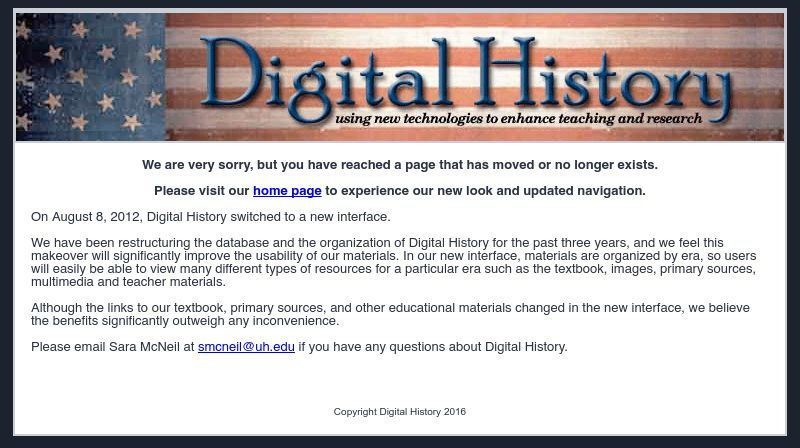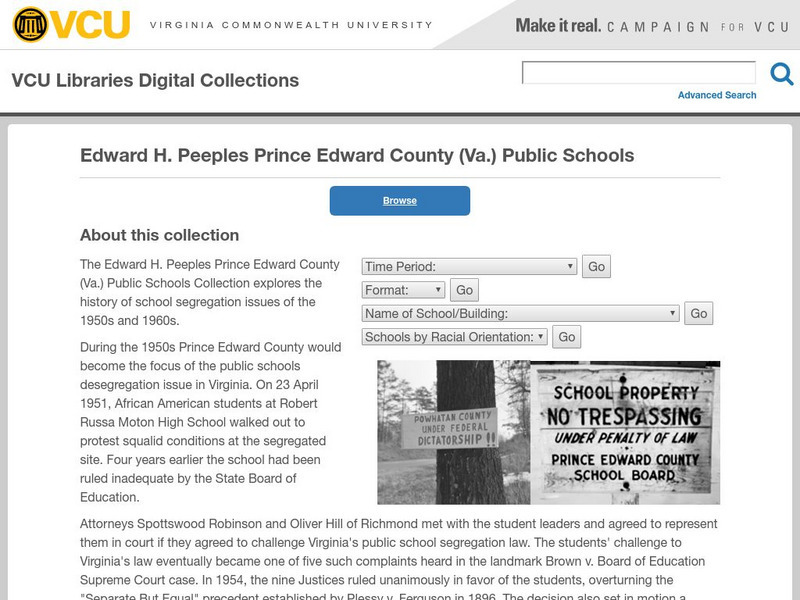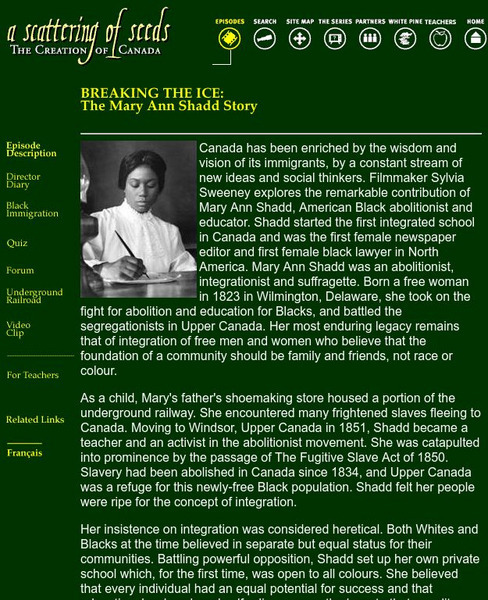Hi, what do you want to do?
PBS
Pbs Learning Media: Documenting Brown: Brown v Board of Education, 1954
The Supreme Court's landmark opinion overturned its earlier ruling in Plessy v. Ferguson and declared segregated schools unconstitutional.
Digital History
Digital History: Simple Justice
Follow the civil rights quest for integrated schools from the beginning in 1849 through the 1954 Supreme Court decision in Brown v. the Topeka Board of Education and the struggle that ensued for decades following in the most reluctant...
Scholastic
Scholastic: Integrating Central High Melba Pattillo Story
This is the story of Melba Pattillo, one of the nine African American students who were the first to enter Central High School in Little Rock, Arkansas. Her story is very informative, and the site ends with a reflection question of how...
PBS
Pbs Teachers: Beyond Brown: Recognize & Combat Segregation in u.s. Schools
A lesson plan on the continuing problem of school segregation that asks students to identify instances of school segregation today, to determine the reasons behind it, and to develop a plan for combating segregation in today's schools....
Read Works
Read Works: School Colors
[Free Registration/Login Required] An informational text about desegregation and the experiences of the Little Rock Nine. A question sheet is available to help students build skills in reading comprehension.
Other
Holton School District: Roll of Thunder, Hear My Cry
Very detailed background and author information, along with questions for each chapter of this novel about life in the segregated society of Mississippi.
PBS
Pbs: African American World History
Featuring an excerpt from a memoir written by Ruby Bridges telling of her experience as the first African American child to attend an all white elementary school in New Orleans in the year 1960.
National Women’s History Museum
National Women's History Museum: Ruby Bridges
A biographical look at Ruby Bridges who became famous at six years of age by being the first Black child to attend a desegregated school in America.
NBC
Nbc Learn: Finishing the Dream: 1962 1963: Standoffs
A collection of archival video clips highlighting the efforts of African Americans to fight racial segregation in education. Looks at the struggle of James H. Meredith to attend the University of Mississippi in 1962, and the resulting...
PBS
Pbs Learning Media: Activism in the Civil Rights Movement
In this interactive lesson, students will learn about the historical background of racial segregation and the brave individuals and groups who stood up against segregation during the 1950s and 1960s.
PBS
Pbs Learning Media: Desegregation Mandate: Jefferson County, Al
A 1967 federal court order resulted in this document, which mandated school desegregation in Birmingham.
University of Virginia
Miller Center at Uva: u.s. Presidents: Dwight Eisenhower: Domestic Affairs
President Eisenhower tried to follow a middle road in proposing and supporting domestic affairs during his presidency. Read about the policies he put forward. Read also about his dealing with Senator Joseph McCarthy, and his spotty...
University of Michigan
University of Michigan Library: Digital Archive: Brown v. Board of Education
A digital collection of materials outlining the famous Brown v. Board of Education case and the events that followed it. Covers Supreme Court cases and school desegregation issues and events.
OpenStax
Open Stax: 1945 1960: African American Struggle for Civil Rights
Examines how Presidents Truman and Eisenhower dealt with the civil rights movement, the steps taken by African Americans to combat discrimination and segregation, and the reaction of white people in the South to the civil rights...
Discovery Education
Discovery Education: Civil Rights: An Investigation
Through the activity provided here, students will not only learn about civil rights and civil liberty but also understand the key roles played by President Johnson and Martin Luther King Jr. during the civil rights movement. The detailed...
Virginia Commonwealth University
Virginia Commonwealth University: Separate but Not Equal
Telling pictures of elementary schools for Blacks and Whites during the 50s and 60s. Discusses the situation in Prince Edward County that led to the Davis v. County School Board of Prince Edward County court case.
NBC
Nbc Learn: 1957 Showdown
In this video/lesson series we will explore September of 1957, when nine black teenagers attempt to enroll in a white high school in Little Rock, Arkansas. Their action sparks one of the pivotal battles of the Civil Rights movement and...
NBC
Nbc Learn: 1954: Separate Is Not Equal
In this video/lesson series we will explore a watershed moment in the Civil Rights movement that came in the Brown v. Board of Education decision. The Supreme Court rules unanimously that, "separate educational facilities are inherently...
Library of Congress
Loc: With an Even Hand, Brown vs. Board at Fifty
A special exhibit at the Library of Congress to commemorate the Brown vs. Board of Education 50 year anniversary.
Khan Academy
Khan Academy: Us History: 1865 1898: Jim Crow
After Reconstruction, states in the South passed laws that barred African Americans from voting and segregated schools, restaurants, and public accommodations.
White Pine Pictures
White Pine Pictures: Breaking the Ice: The Mary Ann Shadd Story
Mary Ann Shadd was born in Wilmington, Delaware in 1823. She emigrated to Windsor, Upper Canada and was a leader in advocating for integrated schools at a time when most Canadians believed segregated schools should predominate. This web...
Read Works
Read Works: Boys Only Girls Only!
[Free Registration/Login Required] An informational text debating single-sex schools. A question sheet is available to help students build skills in reading comprehension.
PBS
Pbs: Eyes on the Prize: "No School in Our State Will Be Integrated"
In this 1962 speech, Mississippi governor Ross Barnett defies the Supreme Court's order to admit James Meredith to the University of Mississippi claiming the federal government was interfering in a state matter.
Other
International Civil Rights Center: Explore History: Civil Rights Movement
In 1960, four students at North Carolina A&T University decided to protest segregation laws by staging a sit-in at the Woolworth store lunch counter. Their action sparked a nation-wide protest by students that spread from just...
























